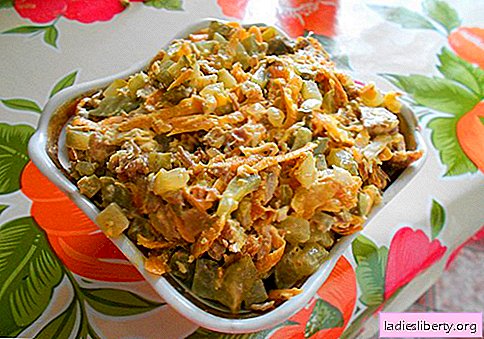
Glomerulonephritis (also called “glomerular nephritis”) is a kidney disease that occurs as a result of the inflammation of glomeruli. This condition may take the form of isolated hematuria and / or proteinuria; either nephrotic syndrome, acute renal failure, or chronic renal failure. These forms are collected in several different groups - non-proliferative or proliferative types.
To determine the type of disease, it is necessary to diagnose a sample of glomerulonephritis. One that develops directly due to a violation of the morphology of the kidneys is called primary glomerulonephritis. And the so-called secondary glomerulonephritis is associated with certain infections (bacterial, viral or parasitic microorganisms, such as group A streptococcus), systemic diseases (vasculitis, SLE), drug use, or cancerous growths.
Glomerulonephritis, depending on the form of the course, is divided into chronic, rapidly progressive and acute.
Glomerulonephritis - causes
The following causes of glomerulonephritis are distinguished:
- infectious (scarlet fever, tonsillitis, sepsis, infectious endocarditis, typhoid fever, pneumococcal pneumonia, meningococcal infection, infectious mononucleosis, hepatitis B, chickenpox, mumps, infections caused by Coxsackie viruses);
- systemic diseases: vasculitis, systemic lupus erythematosus, hereditary pulmonary-renal syndrome, Schoenlein-Genoch disease;
- the introduction of vaccines, serums;
- toxic chemicals (alcohol, organic solvents, lead, mercury, etc.);
- radiation exposure.
1-4 weeks after the negative effect of the provoking factor, glomerulonephritis symptoms appear.
Depending on the form of glomerular lesion, one or the other of the following external symptoms of glomerulonephritis predominates:
- the presence of blood in the urine - the color of "meat slops" in the urine;
- swollen face (swollen mainly eyelids), swollen feet and lower legs;
- blood pressure is higher than normal;
- thirst, decreased urine output;
- increase in body temperature (rarely);
- lack of appetite, nausea, vomiting, general weakness, headache;
- weight gain for no apparent external reason;
- shortness of breath.
Glomerulonephritis - diagnosis
For the diagnosis of glomerulonephritis, such studies and indicators are used:
- general urinalysis (the content of red blood cells, white blood cells, cylinders, protein in the urine is determined);
- determination of the specific gravity of urine (with glomerulonephritis, it is normal or elevated);
- in the blood - an increase in the titer of antibodies to streptococci (antistreptolysin O, antistreptokinase, antigialuronidase);
- a low content of complement components C4 and C3 in blood serum upon returning to the initial level after 6-8 weeks in the case of acute post-streptococcal glomerulonephritis; with membranoproliferative glomerulonephritis, such changes persist for life;
- reduced total protein in the blood serum, in the proteinogram an increased content of A1- and A2-globulin;
- radioisotope angiorenography;
- Ultrasound of the kidneys;
- ECG;
- fundus examination;
- kidney biopsy - makes it possible to clarify the form of chronic glomerulonephritis and its activity, to exclude other kidney diseases with similar symptoms.
Glomerulonephritis - treatment
- bed rest (in the acute phase), often - hospitalization;
- avoidance of hypothermia, limitation of physical activity;
- diets that regulate the amount of protein, salt is limited for edema and hypertension;
- drugs depending on the form and stage of the disease - antibiotics, cytostatics, glucocorticoids, diuretics, antihypertensive drugs (captopril, enalapril, ramipril), lipid-lowering drugs (simvastatin, fluvastatin, lovastatin, atorvastatin), antiplatelet agents;
- radical methods (in severe cases): plasmapheresis, drainage of the thoracic lymphatic duct, hemosorption, kidney transplantation.
Comments











